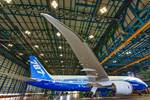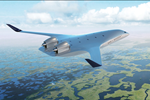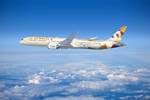Boeing expands ecoDemonstrator flight testing with “Explorer” airplanes
First Boeing ecoDemonstrator Explorer, a 787-10 Dreamliner, to partner with four countries on operational efficiency testing, assess 19 technologies in 2023.
The first Boeing ecoDemonstrator Explorer, a Boeing 787-10 Dreamliner, will participate in an operational efficiency exercise in June 2023. Photo Credit: Boeing
Boeing (Seattle, Wash., U.S.) is expanding its ecoDemonstrator flight test program to further accelerate innovation for sustainability and safety. On April 27, the company announced its 2023 plan to assess 19 technologies on the Boeing 777 ecoDemonstrator, while also adding “Explorer” airplanes that will focus tests on specific technologies.
The first ecoDemonstrator Explorer, a 787-10 Dreamliner, will conduct flight tests in June 2023 from Seattle to Tokyo, Singapore and Bangkok to demonstrate how coordinating navigation across global airspace jurisdictions can improve operational efficiency, which can reduce an airplane’s fuel use and emissions by up to 10%. Using today’s onboard capabilities, Boeing and air navigation service providers (ANSPs) in the U.S., Japan, Singapore and Thailand will collectively sequence the airplane’s routes to achieve the optimal flight path across multiple regions, factoring in conditions such as weather, air traffic and airspace closures. The airplane will fly on the highest available blend of sustainable aviation fuel (SAF) at each location.
“To support our industry’s goal for net zero carbon emissions by 2050, Boeing is expanding our ecoDemonstrator program with Explorer airplanes to test even more sustainability-focused technologies,” Stan Deal, president and CEO of Boeing Commercial Airplanes, emphasizes. “We continue to invest in innovation that reduces fuel use, emissions and noise on our products and to partner with governments and industry to make progress on sustainability during each phase of flight.”
In 2023, Boeing will also use its current flagship ecoDemonstrator airplane, a 777-200ER (extended range), to test 19 technologies including:
- Sustainable wall panels in the cargo hold that are made of 40% recycled carbon fiber and 60% resin made from a bio-based feedstock;
- A fiber optic fuel quantity sensor compatible with 100% SAF;
- An electronic flight bag application featuring Smart Airport Maps, a component of Jeppesen FliteDeck Pro, which reduces operational costs and supports safe taxi operations with the depiction of contextual airport data;
- For all flight tests, the airplane will fly on the highest available blend of SAF locally.
Since its initial flights in 2012, the Boeing ecoDemonstrator program has accelerated innovation by taking new technologies out of the lab and testing them in an operational environment. This has included testing recycled carbon fiber sidewalls and acoustic upgrades. Including the 2023 plan, the program will have tested about 250 technologies to help decarbonize aviation, improve operational efficiency and enhance safety and the passenger experience. Approximately a third of tested technologies have progressed onto Boeing’s products and services.
More information about the 2023 ecoDemonstrator and previous ecoDemonstrator airplanes is available at boeing.com/ecoDemonstrator.
Related Content
-
Next-generation airship design enabled by modern composites
LTA Research’s proof-of-concept Pathfinder 1 modernizes a fully rigid airship design with a largely carbon fiber composite frame. R&D has already begun on higher volume, more automated manufacturing for the future.
-
Composites manufacturing for general aviation aircraft
General aviation, certified and experimental, has increasingly embraced composites over the decades, a path further driven by leveraged innovation in materials and processes and the evolving AAM market.
-
Combining multifunctional thermoplastic composites, additive manufacturing for next-gen airframe structures
The DOMMINIO project combines AFP with 3D printed gyroid cores, embedded SHM sensors and smart materials for induction-driven disassembly of parts at end of life.

















